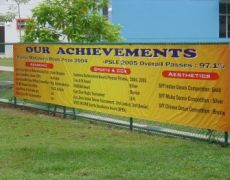If I were as highly acclaimed as Steven Levitt, I’ll ask for the statistics of the number of teachers who have left the profession and check if the increased monetary incentives over the years have slowed down the attrition rates among teachers. If increasing monetary incentives to the teachers cannot slow down attrition rates, perhaps money is not the reason why teachers leave.
But I’m not the author of an international bestseller or a Harvard professor, so I won’t get my hands on those presumably confidential statistics and would have to contend with my own observations and experiences to answer my question of why do teachers stop wanting to be teachers?
Browsing through the websites of Singapore institutions these days, it would be hard to miss the achievements that school administrators so proudly put out to impress the world with. Nowadays, schools can be accredited with the Singapore Quality Class award, the Greed Audit Award, the School Distinction Award, the People Development Award and numerous Best Practices and Sustained Achievement Awards…just to name a few.
Schools also announce their vision and mission to be a niche school in sports, in the arts or even national education. One certainly wonders what being a niche school in National Education entails, that the students display exceptional commitment and patriotism to Singapore ? There is of course a very pragmatic reason for this paper-chase at the country-level.
With that many schools achieving awards and accreditations, Singapore can truly become the education hub it is striving to be; the more the awards, the better the education; the higher the accreditation, the more robust the academic program. Whether or not the relationship between awards and academic rigor is true, a very real consequence is that the nation will reap economic benefits from foreign students flocking to our sea of highly decorated academies.
While this benefits the country economically, to the average teacher, the pursuit of the awards accredited by external agencies or higher authorities entail writing reports and running surveys with students, not to mention being interviewed and quizzed on processes and procedures. This translates to less time to prepare for lessons and less energy to spend with the students. Of course, one would argue that this paper chase would take only a fraction of the teacher’s time. Surely the passion of the teacher will make sure that all these procedures and reports are quickly completed so that the more important task of teaching can be attended to.
In tandem with IDA’s InfoComm 21 exercise, the Masterplan for IT in Education was unveiled in 1997 to equip our young with essential learning skills, creative thinking skills and communication skills. This means that teachers have to be IT-savvy too in order to impart the relevant skills to the students.
But surely the passionate teachers can get all these electronic data entry done quickly so that the more important task of teaching can be attended to. You get the drift.
When I first became a high school teacher, I remember spending time with my students in the school tuckshop to talk about their dreams and aspirations. A few years into the teaching profession, I was still talking to them about their ambitions and plans for the future…after they have made an appointment one week in advance so that the discussion of their future will not clash with the data entry deadlines, accreditation report-writing and upgrading courses.
I cannot be sure why teachers stop wanting to be teachers but I think it might be because they stop thinking of themselves as teachers and more as administrators and corporate executives.
A re-look at performance appraisal?
The performance appraisal at the end of the year hits teachers and professionals in the private sector in more or less the same way. For teachers, the appraisal process comes in the form of the Enhanced Performance Management System which allows for a “structured process of assessing the performance of officers based on competencies and focused on helping teacher identify areas of improvement”.
My memory might have failed me but I do not recall a “love for students” criterion or a “passion for teaching” scale. The current system measures how competent the teacher is in other aspects and assesses whether teachers are performing their duties adequately. A better performance bonus will usually await those who perform beyond what is expected of them.
For now, this means that a good teacher is one who teaches well but the excellent teacher is one who not only teaches well but one who can rake in the awards or implement a new IT initiative.
Of course, passionate teachers can look beyond the pecuniary incentives and concentrate on inspiring their students. These dedicated ones shouldn’t feel the pressure to do more than just good teaching. After all, the love for the students and passion for teaching is immeasurable and should overcome all odds. Besides, if they concentrated on loving and caring for their students, they would be assessed as good teachers, not excellent according to the system, but good nonetheless.
It is great that teachers are regarded as professionals but one wonders if the usual professional standards and assessment criteria can be applied to the teaching service. After all, teaching is as much a calling as it is a profession. Some may even see it as an extension of parenting and if we were to regard teaching as a calling as we do with religious work or parenting, would we still apply the same set of criteria? Would we fill out an enhanced performance management system form to assess the piousness of a religious worker or ascertain the level of professionalism of parents?
I still don’t have an answer as to why teachers stop wanting to be teachers but I’m guessing that it is because teachers are now assessed on how much they can produce rather than how much they love their charges.
Returning to the core of teaching
To the pragmatic person, all this talk about passion and love may be too ephemeral and idealistic but I think it is precisely because we have pushed so far into the drive for efficiency and professionalism that we need to return to the core of the profession.
The teachers and processes make education possible but the children are the ones who are the most important. If we look at the children nowadays, I believe they need love more than they need the awards that their school have or the IT skills that schools can impart to them. They need more passionate teachers because their overwrought and overworked parents are already giving them as much care and concern as they can muster.
If we begin with this perspective to tackle the question, perhaps we will then be looking at how to enable the teachers to spend more quality time with their charges. Resources that are spent on making teachers more efficient and professional would be channeled to hiring teaching assistants to help teachers cope with the relentless assault of administrative work. The paper chase at the schools level would be left to the tertiary institutions like in so many other countries. Teachers would be recognized and rewarded for their great teaching regardless of their new initiatives and new projects.
In short, let teachers do more of what they are passionate about – being in the classroom and teaching their students.
If they get to do more of what inspired them to teach in the first place, I don’t think that many of them would stop wanting to be teachers.
————————
About the author:
The writer was in the service of the Ministry of Education and is currently pursuing his Masters degree. He believes himself to be still passionate about teaching and hopes to take his dream of making a difference in his students’ life wherever he teaches, be it in the schools, in the university; in Singapore or (now that he has written this commentary) outside of his island home.








